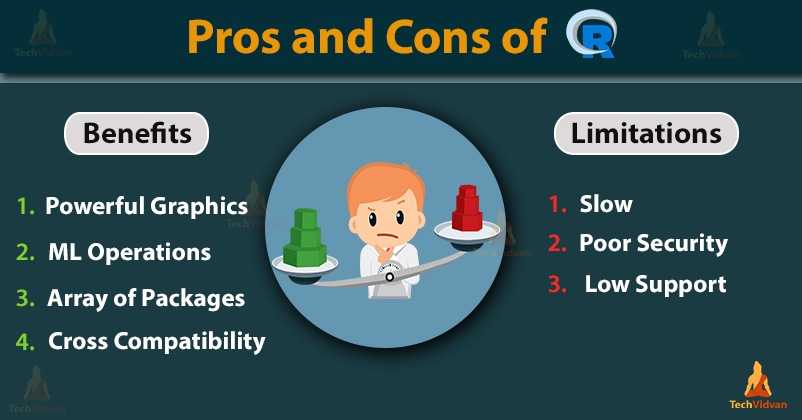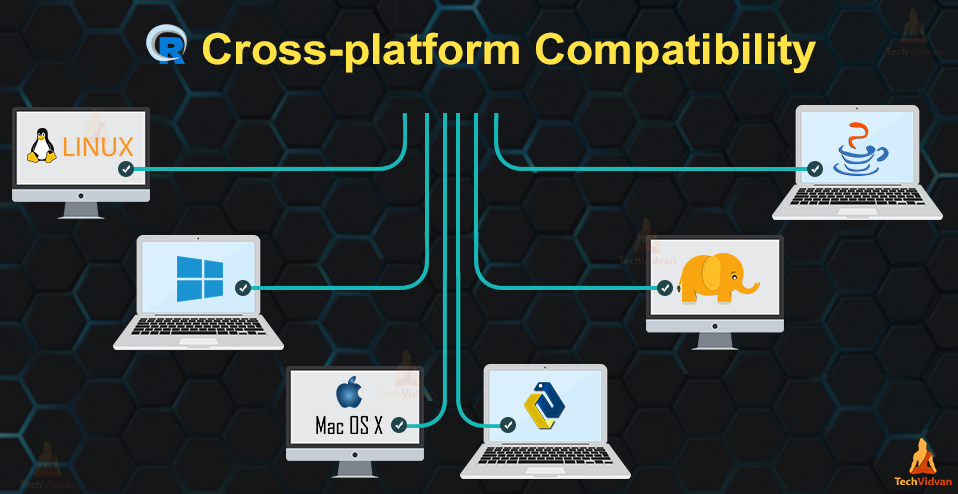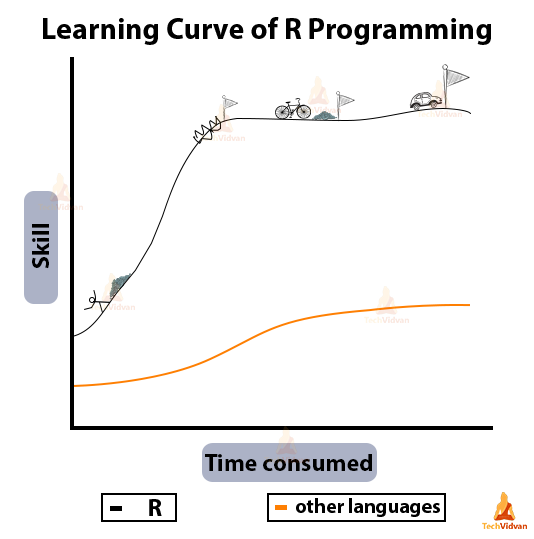Should you start learning R? Weigh the Pros and Cons of R programming
Though R serves as the best statistical programming language of the world, you need to consider the pros and cons of R before start working with R.
R is helpful at every step of the data analysis process from gathering and cleaning data to analyzing it and reporting the conclusions.
With machines generating significantly more data, data analysis languages can only be expected to grow.
But is, however, not as straight up as most people may think (or rather as I used to think).
Though R is a top practiced programming language to analyze and visualize data with having many advantages, it has its own set of drawbacks.
For this reason, I would love to share with you the pros and cons of R programming that everyone especially the newbie programmer needs to know.
First, we will look at the advantages of R to understand the benefits of using it.
Then, we will look at the disadvantages of R to learn about R’s shortcomings.
Pros and Cons of R programming
So without further ado let’s jump into the pros and cons of R programming!
Advantages of R programming
R success revolves around several advantages it provides for beginners and experts alike. Here are the powerful advantages of R programming:
1. Excellent for Statistical Computing and Analysis
R is a statistical language created by statisticians. Thus, it excels in statistical computation. R is the most used programming language for developing statistical tools.
2. Open-source
R is an open-source programming language. Anyone can work with R without any license or fee. Due to this, R has a huge community that contributes to its environment.
3. A Large Variety of Libraries
R’s massive community support has resulted in a very large collection of libraries. R is famous for its graphical libraries These libraries support and enhance the R development environment. R has libraries with a huge variety of applications.
4. Cross-platform Support
R is machine-independent. It supports the cross-platform operation. Thus, it is usable on many different operating systems.
5. Supports various Data Types
R can perform operations on vectors, arrays, matrices, and various other data objects of varying sizes.
6. Can do Data Cleansing, Data Wrangling, and Web Scraping
R can collect data from the internet through web scraping and other means. It can also perform data cleansing. Data cleansing is the process of detecting and removing/correcting inaccurate or corrupt records. R is also useful for data wrangling which is the process of converting raw data into the desired format for easier consumption.
7. Powerful Graphics
R has extensive libraries that can produce production quality graphs and visualizations. These graphics can be of static as well as dynamic nature.
8. Highly Active Community
The R community is very active. There are users from all around the world to help and support you. Many latest ideas and technology appear in the R community.
9. Parallel and Distributed Computing
Using libraries like ddR or multiDplyr, R can process large data sets using parallel or distributed computing.
10. Doesn’t need a Compiler
R is an interpreted language. This means that it does not need a compiler to turn the code into an executable program. Instead, R interprets the provided code into lower-level calls and pre-compiled code.
11. Compatible with other Programming Languages
R is compatible with other languages like C, C++, and FORTRAN. Other languages like .NET, Java, Python can also directly manipulate objects.
12. Used in Machine learning
R can be useful for machine learning as well. Facebook does a lot of its machine learning research with R. Sentiment analysis and mood prediction are all done using R. The best use of R when it comes to machine learning is in case of exploration or when building one-off models.
13. Can Interact with Databases
R contains several packages that enable it to interact with databases. Some of these packages are Roracle, Open Database Connectivity Protocol), RmySQL, etc.
14. Comprehensive Environment
R has a very comprehensive development environment. It helps in statistical computing as well as software development. R is an object-oriented programming language. It also has a robust package called Rshiny which can produce full-fledged web apps. R can also be useful for developing software packages.
Disadvantages of R Programming
It’s no secret that there’s also a dark side to R programming. Let’s move on to the disadvantages of using R:
1. Steep Learning Curve
As many have said, R makes easy things hard, and hard things easy. R’s syntax is very different than other languages so are its data types. The learning curve for R is pretty steep for a beginner. Though R is a bit difficult in the beginning, data science enthusiasts still prefer to learn it due to the amazing features of R.
2. Some Packages may be of Poor Quality
CRAN houses more than 10,000 libraries and packages. Some of them are redundant as well. Due to the large quality, some of the packages may be of poor quality.
3. Poor Memory Management
R commands don’t concern with memory management. As a result, R can take up all the available space.
4. Slow Speed
The programs and functions in R are spread across different packages. This makes it slower than alternatives such as MATLAB and Python.
5. Poor Security
R lacks basic security measures. So making web-apps with it is not always safe.
6. No Dedicated Support Team
R has no dedicated support team to help a user with their issues and problems. But the community is quite large, so everybody helps each other out.
7. Flexible Syntax
R is a flexible programming language and there are no strict guidelines to follow. You need to maintain proper coding standards to avoid messy and complicated code.
Summary
In this article, we looked at some of the major pros and cons of R programming language. R has workarounds for some of its cons by using extra libraries or packages.
Like any other technology, R is not without its negatives but it is safe to say that the positives outweigh them.
But from my experience, I would recommend you to take an overview of R if you are yet not clear what exactly R is!
Still, any confusion regarding R programming?
Ask TechVidvan experts in the comment section below!
Keep Learning.



